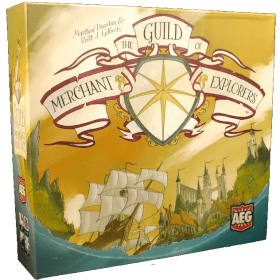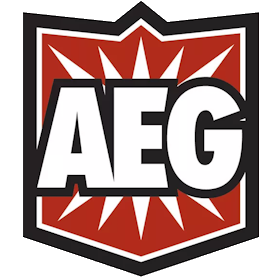The Guild of Merchant Explorers
 Em The Guild of Merchant Explorers, cada jogador começa com uma cidade no seu tabuleiro de mapa pessoal.
Embaralhe o baralho de cartas de terreno e revele a maioria dessas cartas uma por uma. Com base no terreno revelado, cada jogador coloca no seu tabuleiro cubos que estão conectados à sua cidade inicial ou a outros cubos. A sua intenção é completar áreas no seu tabuleiro, atravessar os mares para novas terras e estabelecer novas cidades no tabuleiro. Você pode explorar navios naufragados em busca de tesouros - o que lhe dá capacidades especiais de colocação - e criar ligações entre locais para ganhar pontos de bónus. Os objetivos comuns podem ser concluídos por todos os jogadores, sendo que os que os concluírem primeiro marcam mais pontos.
No final de uma rodada, todos os cubos são removidos de cada tabuleiro, deixando apenas as cidades no mapa, por isso, se não estabelecer novas cidades, ficará preso nos mesmos locais.
The Guild of Merchant Explorers contém várias cópias de quatro mapas diferentes, e o jogo foi projetado para que você possa jogar remotamente com uma ou mais cópias.
Em The Guild of Merchant Explorers, cada jogador começa com uma cidade no seu tabuleiro de mapa pessoal.
Embaralhe o baralho de cartas de terreno e revele a maioria dessas cartas uma por uma. Com base no terreno revelado, cada jogador coloca no seu tabuleiro cubos que estão conectados à sua cidade inicial ou a outros cubos. A sua intenção é completar áreas no seu tabuleiro, atravessar os mares para novas terras e estabelecer novas cidades no tabuleiro. Você pode explorar navios naufragados em busca de tesouros - o que lhe dá capacidades especiais de colocação - e criar ligações entre locais para ganhar pontos de bónus. Os objetivos comuns podem ser concluídos por todos os jogadores, sendo que os que os concluírem primeiro marcam mais pontos.
No final de uma rodada, todos os cubos são removidos de cada tabuleiro, deixando apenas as cidades no mapa, por isso, se não estabelecer novas cidades, ficará preso nos mesmos locais.
The Guild of Merchant Explorers contém várias cópias de quatro mapas diferentes, e o jogo foi projetado para que você possa jogar remotamente com uma ou mais cópias.
Número de jogadores: 1 - 4
Duração do jogo: 18 mn
Complexidade: 2 / 5
Jogue The Guild of Merchant Explorers e 1223 outros jogos online.
Sem downloads, direto no seu navegador.
Com seus amigos e milhares de jogadores do mundo inteiro.
Grátis.

Jogue The Guild of Merchant Explorers e 1223 outros jogos online.
Sem downloads, direto no seu navegador.
Com seus amigos e milhares de jogadores do mundo inteiro.
Grátis.

Sumário de Regras
Goal
The goal of the game is to earn as many coins as possible. Players earn coins by placing explorers on cities, ruins, or discovery towers. Players can also create trade routes between cities, the capital, or other villages.
Gameplay
The game consists of 4 eras. In each era, players will take simultaneous turns after revealing explore cards until the exploration deck is exhausted.
At the end of each era:
- All explorers (cubes) are removed from the maps. Villages, trading posts, treasure tokens, and discovery towers are left on each player's maps.
- The next era's explore card is added to the exploration deck.
The game ends at the end of the 4th Era and the player with the most coins wins.
Spaces
There are 4 basic terrains to explore:
- Grassland
- Desert
- Mountain
- Sea
Each terrain space can be 1 of 5 different types:
Blank Spaces
Empty spaces where Villages may be placed.
Coin Spaces
Earn coins when explored.
Ruin Spaces
Special sea terrain; earn a Treasure Card when explored.
City Spaces
Connect 2 City Spaces to create a trade route.
Discovery Spaces
Special "wild" terrain; earn coins when explored.
Exploration cards
There are 5 basic exploration cards that will be available in every era:
- Explore one mountain space
- Explore up to two desert spaces (need not be adjacent)
- Explore up to two grassland spaces (need not be adjacent)
- Explore up to three sea spaces (must be adjacent and in a straight line)
- Explore up to two spaces of any terrain (must be adjacent; need not be the same type)
In addition, there is an era card for each era. The card(s) for the current and all previous eras will be shuffled into the exploration deck with the five basic cards.
The first time each era card is drawn, each player will draw two cards from the investigate deck and choose one to keep. They will use the associated special exploration action every time that era card is drawn, immediately and in future eras.
The fourth era card is special. Instead of drawing new investigation cards, each player will choose one of their existing investigation cards from eras I, II, or III to use. That action will be used immediately, as well as when its own card is drawn.
Placing explorers
Players may simultaneously place explorers based on the currently revealed explore card.
Players must place their explorers directly adjacent to the following:
- The capital space
- Previously placed explorers
- Player villages
Place explorers one at a time. All special actions (below) occur immediately upon placing the necessary explorer. If there are still explorers to be placed, they will continue to be placed after the action is completed.
Discovering villages
Discover new villages by fully exploring a region in a single era.
A region is a contiguous group of tiles of the same terrain.
When a region is fully explored for the first time, immediately replace an explorer on one of the blank tiles in that region with a village. Then, score coins equal to the current era.
Each region may only have one village.
Villages will not be removed at the start of each era, as opposed to explorers.
Creating trade routes
Connecting 2 city spaces creates a trading route. Cities can be connected with a chain of explorers, villages and/or your capital.
When creating a trade route, multiply the values of both cities and gain that amount of coins.
Then, cover up one of these cities with a trading post. This city can not be part of a trading route anymore.
Discovery spaces and towers
Discovery spaces are "wild" terrain, which means it can be explored with any type of exploration action.
When explored, gain coins based on how many other Discovery Spaces have been explored by the player (6/8/10/14).
Then, cover up the space with a Tower. This space can not be scored again.

